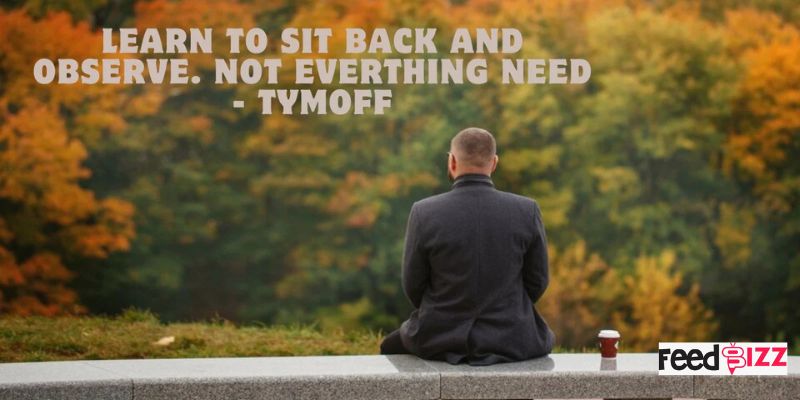Have you ever been caught up in the whirlwind of life and acted first and thought later about what happened? Every time Tymoff tries to learn that not everything must – It is a strong attitude that can help a person develop patience and to take the time and wait. This approach can revolutionize how we approach challenges, relationships and even personal development.
Today, people often want an instantaneous reaction to anything, be it an argument, a problem at work, or just a chat. In contrast, depending on something takes moments to give a reaction and helps the person think about the particular feelings, consider the circumstances better and come up with rational actions. It’s not about lack of care; it’s about planning.
Throughout the years of observation of everything around me, observation IS not only a tool that calms me down but also makes me understand myself and other people WAY deeper. In this practice, we can untangle ourselves from the noise and chaos of the modern world, which aims to make what is important and embrace what is not. Read in detail about Learn To Sit Back And Observe. Not Everything Need – tymoff.
Understanding the Phrase: Learn to sit back and observe. not everything need – tymoff
The phrase puts a lot of emphasis on thinking and observing a situation before taking any action. Sometimes, there is a need to do something right now, but this contributes to a great indication of its result and regret. The primitive brain talks about the ability to choose the right action when a person can choose to stop and think before acting.
The aim of the phrase at its base level is to address the component of the heart; therefore takes a concept of empathy and personal reflection. It calls out to people to learn how to come into action and be present without prejudice and act without anger. It is most effective given the current nature of the environment, which is filled with distractions and provocative stimuli. Consequently, observation builds up a skill of responding rather than reacting in the areas of interpersonal relationships, work and personal development.
The Importance of Observation in Today’s World
Observation is a virtue that is no longer popular among the Gen-Y or the society of the present. It takes the knack and the time or the time and the knack as components intertwined with one another and both hidden by the speed of life. However, observation plays a key role in the shared and the individual part of the abilities and skills of emotional intelligence and critical thinking.
Observing enables persons to handle incidences to enhance judgment. This skill increases attention to everything around: objects, people, and feelings, as well as interpersonal relationships. It is not inertia, but it is about being alert and fully aware of our surroundings and interactions that matter. In the professional areas, observation enhances action, cooperation, and authority. In personal life, it helps for better comprehension and further interpersonal relations with the personalities. Developing this skill is crucial for success in today’s reactive environment, which is prevalent in almost all organizations.
Why Not Everything Needs a Reaction
This page may reveal the fact that responding to each occurrence creates tension, misinterpretation, and conflict. Many times in life, the best action is none at all. Temperance helps people avoid using up their energy, keep their emotions in check, and reduce stress levels where necessary.
Not every challenge or provocation requires immediate attention. By sitting back and observing, one can evaluate whether the issue is worth engaging with. This approach reduces emotional reactivity, leading to healthier interactions and better outcomes. Moreover, choosing not to react often disarms tense situations and prevents escalation. By mastering the art of selective response, individuals can focus on what truly matters, enhancing both productivity and peace of mind.
The Benefits of Sitting Back and Observing
Lurking has innumerable advantages which apply to practically every aspect of life. However, one of the clarities that accrues from this research is that decision-making becomes enriched. Observation facilitates the acquisition of more information; hence, sound and appropriate decisions are made.
The other advantage of body massage is stress relief. Since people become less anxious when they are taught how to analyze situations and take actions without further stress, they avoid any anxiety that is a result of their actions. Observation also helps in improving interpersonal relationships because it creates understanding. If people attend to others’ signals more closely, then they will address them more warmly and efficiently. Finally, it expands and deepens the practice of observing the leads to a healthier, more conscious/present, and happier life.
Practical Steps to Develop Observational Skills
Building strong observational skills requires consistent practice. A great starting point is mindfulness meditation. This technique trains the mind to focus on the present moment, enhancing awareness of surroundings and emotions.
Active listening is another powerful tool. By fully engaging in conversations and paying attention to verbal and non-verbal cues, individuals can better understand others’ perspectives. Journaling is also effective; writing down observations about daily interactions helps sharpen awareness. Additionally, creating a distraction-free environment supports focused observation. Over time, these practices will strengthen the ability to sit back and observe, leading to thoughtful, intentional actions.
Overcoming Common Challenges in Observation
Observation can be challenging, especially in a world filled with distractions and emotional triggers. One major obstacle is impulsiveness—the urge to act immediately without reflection. Overcoming this requires mindfulness and self-discipline.
Another challenge is the constant influx of information from digital devices. To counter this, individuals should establish boundaries, such as limiting screen time and creating moments of silence. Practicing patience is also essential; observation is a skill that develops gradually with consistent effort. By recognizing these challenges and addressing them proactively, individuals can build stronger observational habits and improve their overall well-being.
Case Studies: Success Through Observation
Observation has played a critical role in the success of many individuals, particularly leaders and innovators. For instance, Steve Jobs’ ability to observe market trends and consumer behavior helped him create revolutionary products. His thoughtful approach to innovation stemmed from keen observation.
Similarly, in personal growth stories, people who practice observation report greater self-awareness and improved relationships. For example, a professional who takes time to understand team dynamics can foster a more harmonious work environment. These cases highlight how observation leads to meaningful insights and transformative outcomes.
Observation in Professional Settings
At the workplace, observation is a powerful tool to improve interactions and decision-making abilities. Self-generated behavior ensures that managers are able to note their team members’ behaviors to fill the strengths bucket and address the challenges bucket.
Another benefit to observation is that when observing, professionals get to listen to how colleagues view certain issues. For leaders, it gives little or much understanding of the dynamics of the organization and assists the leaders in making the right decisions. Stalled can improve observation to be able to avoid problems in advance, change and add value to the work teams. By developing this skill, the person can deal with specific work spheres much more easily and efficiently.
Observation in Personal Relationships
In the case of observation, the strength of a personal relationship is built due to interpersonal understanding. Being able to observe loved one’s emotions and actions should allow people to meet their needs and comfort them.
For example, the economist can notice that in two individuals’ conversation there are some postures or intonations which express some emotions that are not reflected in words. This practice also aids in conflict-solving since people tend to think before calming down to give their responses. To do so, it is necessary to recall that in romantic and familial relationships, observation increases trust and intimacy. I developed this skill with the aim of enhancing more positive and healthy relationships.
Long-Term Benefits of Practicing Observation
Some of the long-term importance of observation goes beyond correcting or improving faulty decision-making and relationships. In the long run, it helps people develop increased awareness of themselves in terms of how they think and act.
This leads to human transformation as well as increased emotional capital. It also leads to a more harmonious existence, for people are given the tools whereby their lives are re-orientated. Observation is not just a knowledge area since it implies a definite way of being, a conscious way of proceeding and an attitude toward the now.
Actionable Tips to Start Observing Today
It is recommended to approach the process of observation systematically – this means taking baby steps. Spend a couple of minutes each day praying or listening to music in order to sharpen your concentration. Please make use of what is said as follows: listen to the speaker and concentrate on their message.
The other effective tip is to write what you witnessed or observed and the kind of responses that you have had in a day. This is in light of the fact that interruptions must be done away with by creating time that is free from the various gadgets. If one practices these methodologies in the day, that person will be able to develop impressive observational skills and receive the valuable impact of this ability.
FAQs About Learn to sit back and observe. not everything need – tymoff
What does “Learn to sit back and observe. not everything need – tymoff” mean?
The phrase highlights the importance of patience and thoughtful observation before reacting. It emphasizes restraint, mindfulness, and intentionality in decision-making.
How can observation improve my life?
Observation enhances decision-making, reduces stress, and improves relationships. It fosters emotional intelligence and self-awareness, leading to a more balanced and fulfilling life.
What are the challenges in becoming more observant?
Challenges include impulsiveness, distractions, and a lack of patience. Overcoming these requires mindfulness practices, self-discipline, and creating a calm environment.
Can observation help in professional settings?
Yes, observation enhances workplace dynamics by improving communication, decision-making, and team collaboration. It also helps leaders understand organizational challenges.
What are quick tips to start practicing observation?
Start with mindfulness techniques, engage in active listening, limit distractions, and journal your observations. These steps help build strong observational habits over time.









